| "Be England what she will, with all her faults she is my country still." |
| Charles Churchill |
As a long-time fan of director Shane Meadows, I often wondered when he would finally get the recognition he deserved. To my teenage self, by 'recognition' didn't mean written critical plaudits or good box-office receipts – though I knew they were definite indicators of a film about make it's mark – it meant shiny little statues, whether those were golden masks or golden men, it mattered little. What I wanted was for someone whom I genuinely admired to stand up there and hold in it his hands. Why? Because then everyone would know his name and know his face in an instant. As fate would have it, my wish came true just under a decade since the release of the first Meadows film I ever saw, A Room for Romeo Brass, when Meadows' This is England won the BAFTA for Best British Film. It was an odd moment for me and a proud one too. I'd always felt an affinity with his work and even with the man himself, and that only grew over time. For a while, I'd turned my back contemporary on British cinema, because it didn't speak to me the way it once did or even in a way I understood. Meadows' films changed all that, and along with Lynne Ramsey, near enough restored my faith in what our country could make and how it could express itself.
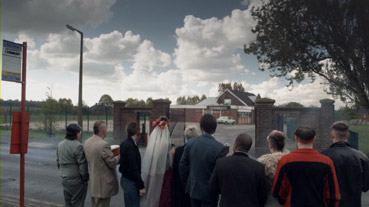
However, I have a great deal of respect for Mike Leigh, Ken Loach, Alan Clark and Peter Mullen and the social realist roots of British cinema, as well as those influenced by it – Meadows of course, amongst them. As my interest in film grew, I actively sought out these famous, sometimes infamous films, Cathy Come Home one week followed by Kesin the next. On I went in this quest, this cultural journey, learning about people, about lives, and about the country in which I lived beyond the stories told to me by family and the experiences I had with my friends. Late night television was my saviour, and Channel Four in particular – though I now know it had drifted a little from it's original remit – fit the bill for me, and gave me access to things I wouldn't see until I got a bigger VHS collection and a latterly, a DVD player.
Even so, I didn't always connect with them on a personal, emotional scale. Back then at least, there was always too much of one element and too little of another. I didn't like 1990s mainstream Hollywood cinema for much the same reason; the primary difference being it was it was too ersatz, so I followed independent cinema instead, becoming all too used to accents and cities far removed from my own life. When I did glance back towards our own industry, I felt more at home, and yet at the same time, discouraged, I didn't like dark melancholy of Nil by Mouth or the bittersweet air of All or Nothing. Sweet Sixteen came close, but not close enough for me.
I was looking for balance; I was looking for someone to hold up a mirror to my life, so I saw it reflected back at me more or less the same as I lived it: highs, lows, humour, sadness and every other state in between. Then, I had another kind of longing, to have the kind of cultural event that comes with some films; one that encapsulates its period and catches your attention all at once. The film everyone talks about, likes the music, quotes the dialogue and dresses like the characters from. A true cult film, like The Italian Job, Quadrophenia or Trainspotting.
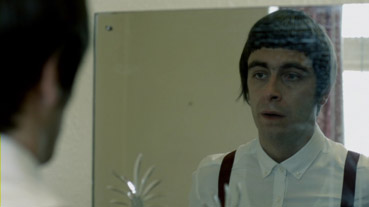
Shane Meadows gave me all of it, and how. He gave me This is England. I was his perfect pitch, his model audience member: a Midlands twentysomething, with a love of music, who devoured just about anything set from the 1960s onwards. It was an easy sell. The music, the culture and the style pulled me in, just like I'd been searching for all these years, but I got something else too. I got a story I never expected to unfold (both on and off-screen). Watching Shaun (the surety of Thomas Turgoose's performance at such a tender age still a revelation even now) as he's accepted and embraced by Woody (a marvellous Joseph Gilgun) and is ragtag band of Skinhead mates was the thing that really stayed with me. These characters felt real, could have been people were relatable, were honest, even if I didn't always agree with their actions. They came alive to me in a way I never thought possible. Though that's mostly down to the chemistry of the cast and their obvious skill, it's also down to the kind of film This is England actually is. Yes, it's a window on the past, but after while, you forget you're staring at through a window, and let yourself go beyond it, sit with them in their cars, bedrooms and living rooms. For a little while at least, you're one of them.
Imagine my excitement then when I heard whisperings of a television spin-off, This is England '86, set three years after the events of the film, around the time of the World Cup. The possibilities were limitless. There were a multitude of unanswered questions and paths it could take. I'd wondered about the fates of Milky (the excellent Andrew Shim), Combo (Stephen Graham, in what's arguably his best performance) and Shaun. If there would be more exploration of the girls Smell (a wonderful Rosamund Hanson), Lol (the outstanding Vicky McClure) Kelly (Chanel Cresswell), and Trev (Danielle Watson), and that was before you even thought of Gadget (Andrew Ellis), Pukey (Jack O'Connell) or anyone else Shaun might have crossed paths with in the intervening years. Of course, at the simplest of levels, I was just happy at the prospect of seeing more of the gang, on my television for a whole month (it's a pleasure that remains in the series itself). My expectations only got higher when I saw that the focus would this time, wouldn't be with Shaun, but with instead with Lol, the character who had most intrigued me most, and I hoped it would mean that we would get to see more of Lol and Milky together, so they could have a quasi Romeo Brass reunion.

My only worry was that it would never quite reach the heights of its now cult cinematic predecessor. Lightning rarely strikes twice. Sequels are notoriously hard to pitch, and rarely, save for some notable exceptions – such as the sequels of The Godfather, The French Connection and Mad Max – improve on the original. I feared – albeit very briefly – that This is England '86 would suffer the same fate as so many other films, and be a pale imitation of what came before it, which would also taint my relationship with and enjoyment of England. Those fears were, I'm glad to say, unfounded. Meadows and his team were all too aware of the shaky ground they were walking on, and the many pitfalls it hid. He had no desire to repeat England. A self-confessed maker of 'laddish' films, he wanted to do something fresh and different, evolve. Most of all, he wanted to prove how good television could be, harking back to the days when he watched Alan Clark's Made in Britain and Stephen Frears' Walter.
That's exactly what he's done.
The series opens with Shaun, now fifteen, taking the last of his exams, pondering his future envisioning a summer travelling around on a scooter, whilst his mum Cynthia (an always impressive Jo Hartley) is desperately trying to keep her son's feet on the ground and out of the dole queue, finally managing to secure him something with the help of kindly shop keeper Mr Sandhu (Kriss Dosanjh), who helps out by taking him on as an assistant, selling videotapes. Elsewhere, the gang who took him under their wing is largely unchanged, except for new addition, Harvey (a fantastic Michael Socha), once Shaun's tormentor at school, he's now Gadget's sidekick, fully integrated into the gang, alongside Meggy (Perry Benson), Banjo (George Newtown), Milky, Gadget (complete with hip-hop influenced outfit), Trev, Kelly (now sporting a candy pink Mohawk, beautifully played by Creswell) and Smell (as fashion forward as ever, taking Meadows' penchant for improvisation to new levels) eagerly awaiting Woody (now looking particularly Paul Weller-esque) and Lol's (sporting a short bleached crop that's slightly Madonna inspired) forthcoming wedding. Shaun is reunited with his friends once more at the local hospital after a run in with motorcycle riding Casuals, Flip, (Perry Fitzpatrick, in a near series-stealing performance) and Higgy (Joe Dempsie) leaves him with a head wound and Meggy suffers a heart attack during the wedding ceremony, calling things to an abrupt halt. Unfortunately for Lol, being jilted by fiancé Woody will be the least of her problems when mum Chrissy (an incredibly affecting Katherine Dow Blyton,) returns with her estranged father Mick (Johnny Harris at the height of his powers) at her side. In her darkest hour, Lol finds an unlikely hero in Combo, but her life is changed irrevocably and she needs the support of the gang more than ever before.
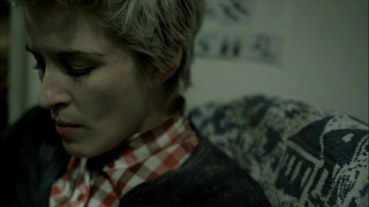
It's no stretch to say that England '86 is a British drama landmark of equal importance, and I'd argue, Meadows' best work to date and not only because it contains his first fully-fledged female lead in Lol. Though the 'us' and 'them' mentality that once existed between film and television had dissipated, and Meadows never subscribed to it, since, he, like many of us, watched milestone dramas on television rather than in a cinema, and he believed that outlet had not only declined in quality, but had become unchallenging. It's a viewpoint, that if taken literally, feeds nicely into the omnipresent debate concerning the supposed 'dumbing down,' of television – with the reality format often cited as the root cause. It may be correct to a degree, but it also highlights the fact that television has the capacity to be cinematic; a virtue often bestowed on transatlantic imports such as The Wire and Mad Men, with their high production values. In the case of England '86, this is more than an aspiration on Meadows' part, it's a requirement, and there's not even the faintest hint of inferiority in its meticulous production design and aesthetic, the latter of which was overseen by director of photography, Danny Cohen who worked with Meadows previously on England and Dead Mans' Shoes, as well as frequent projects for television (including Tom Hooper's Longford, Stephen Poliakoff's Capturing Mary and Domonic Savage's Dive). Nothing about England '86 is 'smaller' just because it's made for television. Every effort has been made to ensure that it stands up to England, but also stands on its own (for the technically oriented, there's more about the high-definition equipment used on the commentary tracks).
Though it undoubtedly carries the indelible Meadows stamp, it's very much collaborative piece. As his first foray into television and less sure of the medium (and its constraints) Meadows was keen to work with people who knew the format and had as much passion for the characters as he did, enabling him to share the workload. Meadows found them in Skins and Cast Offs writer Jack Thorne (recommended to him after discussions with Channel Four) and Tom Harper, director of several short films and TV projects, including the BAFTA-winning Misfits. The two worked together shortly before beginning England '86 on their debut feature-length film The Scouting Book for Boys (which incidentally also stars Thomas Turgoose). Whilst Meadows and Thorne co-wrote the series entire, Harper took up directorial duties on the first two episodes, leaving Meadows with the final two.

Given that setup, you'd be forgiven for thinking that there's an obvious difference in visual style and or tone or to use an appropriate football analogy, that it's rather a game of two halves. The short answer to that is yes and no. Obviously, if you're well-versed in Meadows work, then you will notice certain trademarks that are absent from the first two episodes which are absent from the first, but the same can be said for Harper. Anyone who has seen The Scouting Book for Boys in particular will see the similar visual cues. Overall, it's surprisingly even, which is a testament to how well the collaboration has worked. Where England '86 does change more markedly is in it's tone. As is typical in the writing of Meadows and Thorne; for all the moments of humour and lightness, there's it's equal and opposite number, darkness, and there's refreshing fearlessness to what we do see unfold. Though this is primarily Lol's story, just as England was Shaun's, we are given insights into those closest to her.
You will be tested, you will be repulsed by it, you'll feel enraged, and you will be thinking about it longer after the credits roll on the final episode.
Meadows admits himself that the latter half of the series is darker than the first, but the shift isn't jarring, and is accurately described by the director as a 'turn in tone.' Again, fans of his work will know the twists he likes to take, but there's something more unsettling about that turn this time around. The bloom, most definitely comes off the rose, and we watch every one of its beautiful petals drop; the pain of that loss reflected in Lol's face. She begins this series with the classic dream of wanting to marry her soul mate Woody, and ends it stuck amidst a nightmare. The arc or rather descent, is by turns awe-inspiring – because McClure is so gifted – and harrowing, because we've come to know and love these characters. It's where the intimacy that comes with screening on television really adds to the experience, sometimes to uncomfortable levels. That mirror I asked for definitely arrives – especially in the meta-referential moments with the gang watching telly at home or at the pub - nailing the idea that national identity and national calendar events like the World Cup go hand in hand – but I wasn't expecting it to shatter so spectacularly.
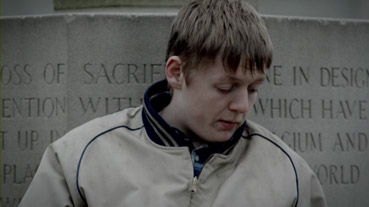
But, it's not all doom and gloom here. Memorable moments are also borne out happiness as well as sadness. There are some lovely sequences with the gang all together, singing on the bus on the way to the wedding; racing their way round Shaun's estate on golf carts at four o'clock in the morning; or wrecking havoc on timid neighbour Jeremy a.k.a Carrot Bum (in a brilliant little cameo by Jack Thorne) or scrapping with Flip, Higgy and the boys in the park in a sequence with owes more to slapstick than it does to martial arts, and is a nod to Meadows' early features Small Time and Where's the Money Ronnie!. Full comedic honours though must be given to Fitzpatrick, Ellis and Socha (Harvey's role in the gang was originally written for Pukey, but had to be revised as Jack O'Connell was unavailable). The former is just a pop culture icon-in-waiting, with poor Shaun being the butt of many a joke, he's fantastically over-the-top, throwing his weight about, and shouting his mouth off at every opportunity. Luckily, he's all bark and little bite. The latter definitely come as a package deal, and if you see England '86 as a tragedy, then this duo are definitely the chorus, because you just don't know what they'll do next. Both actors really work well together, and their delivery is spot on. The joy isn't relegated to the audience either, since Harvey gets as much of a laugh out of playing pranks on Gadget as we do, whether it's passing off sherbet dip as cocaine; challenging him to wheelchair races at the hospital or constantly ribbing Gadget about his not-so-secret crush on Lol's pretty younger sister, Kelly. When it comes down it though, Harvey is there for his friend, and anyone else who needs him.
England '86 takes what made England work so well, and builds upon it, giving us time to learn more about the characters, to see their lives fleshed out, and gives characters who we only got glimpses time in the spotlight; like Kelly's shy best friend Trev (Watson delivers everything with a quiet grace that belies her years), and Trudy (Hannah Walters, in a great comedic turn), who once fitted the gang with their prized Docs, and now works in the registry office as a receptionist, and takes a shine to Gadget (giving some light relief in the series' back half). By the same token, we also see different sides to characters, throwing up a few surprises and some unexpected depth. In the face of it all, the group remains as tight as ever, even when their bonds are tested to the limits. Even the boys, Woody in particular show their vulnerable side. He's still the gang's version of the class clown, but we do see that he has another side, as he struggles with wanting to stay true to himself; be the person that everyone – and Lol – loves, who hangs out with his mates whilst wanting to better himself, carry on up the ladder at work and provide for Lol without becoming his father, who he sees as staid and boring, a shadow of his former self. That polarity is something Woody fights with all along, and is one of the many struggles he and others face as they strive to make their lives better in the face of mass unemployment; to grow and to change along with the world around them when they feel like they no longer have a place in it.
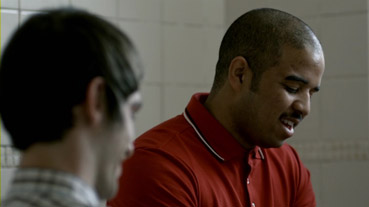
Even when you've watched the credits go up, you'll be left wanting more, left wondering about where this mismatched band will go next. Meadows is already planning another series, set in 1989 or 1990, focussed on the burgeoning rave scene in Manchester and The Haçienda; the first time he connected with a sub-culture proper, and after the success of England and England '86 it's easy to see why he'd be open to telling us more. These are the kind of characters who could live in our social and cultural consciousness for years. Film critic Jason Solomons has dubbed them "the fabric of England," which might sound a hyperbolic, but in this case, such lofty praise is certainly justified. What's more, we'll wait any number of years to see how that fabric changes: whether it flutters in the breeze; stands torn but defiant in the face of a gale or goes up in flames, we'll be there to watch how it repairs, stitch-by-stitch; and maybe, we'll see Meadows, his team, and his incredibly talented cast collect more of those golden statues.
This is England 86 was shot digitally on a Red HD camera but is not being released, at least not yet, on Blu-ray. If the DVD is anoything to go by it should look pretty special if it ever is. The picture quality is consistently impressive, with an excellent level of detail that really pops on facial close-ups, and well balanced contrast that doesn't suffer unduly when the light levels drop. Overall colour feels muted in many scenes, having earthy hues in some and a cooler look in others, but this always feels deliberate and is likely the result of post-production timing. Overall a terrific transfer that definitely improves on its standard def TV broadcast.
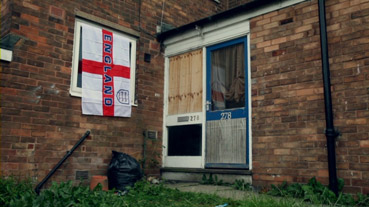
The Dolby 5.1 surround track is far from attention-grabbing, being a subtle mix that befits the tone of the drama, with the surrounds used subtly for atmosherics and music. The recording is very clear, with a very slight treble bias. Music sound good throughout.
This is a handsome little set. The transfer is top notch (even for fastidious blu-ray-loving eyes) and it comes with plenty of extras to pore over outside the four hours of viewing provided by the series itself, and has something for everyone whether new to This is England fold or one of the loyal fans who embraced the film so wholeheartedly.
Disc one contains audio commentaries and the first three episodes, which can be watched sequentially via the 'play all' feature or chosen individually. Disc two contains episode four and the majority of the supplementary material. Optional subtitles are available on both discs and all episodes are chapterised.
Beyond the technical, the disc menus are not only easy to navigate, but they're nicely designed too, and tie in with the other promotional material (not always a given). As a nice bonus for the music lovers in the audience, instead of instrumental music loops playing over these, we get more popular music from the period (everything from Jimmy Cliff to Billy Bragg).
I only have one small gripe. Given that this release carries a nice little package of extras, I'd hoped the Home Video teaser trailer, where the gang film each other with a camcorder, would be included. It's a clever piece, and taps right into the elements that made the film so successful, chiefly camaraderie and nostalgia. If you've yet to see it, it's still available to view here at Channel 4's official site for the series.
DISC 1:
As with the episodes, the commentaries can individually selected or if you prefer, played sequentially as the episodes progress by choosing 'play commentaries' from the sub menu.
If watching the series through for the first time, listen on a subsequent viewing, since there is discussion of events in later episodes. Though it's possible to watch and listen at the same time, the commentary track sometimes competes with the audio, particularly in during louder moments and group scenes (particularly evident on the commentary for episode one).
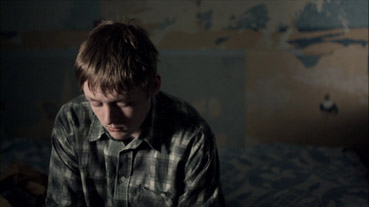
Audio Commentary with Tom Harper, Jack Thorne and Thomas Turgoose [Episode One]
Episode one and two director Tom Harper is joined by series co-writer Jack Thorne and cast member Thomas Turgoose. Harper and Thorne give the most here, with an obvious technical focus, concerned with the editing process and character development, overlapping nicely. In contrast, Turgoose's comments are more anecdotal, it makes for a great mix, because their banter feels genuine, rather than staged. I imagine that if you recorded yourself watching back home videos, the result would be the same. When they express like and admiration, it comes from an honest place, and in the case of Mr Turgoose, brings humour with it. Though it sometimes suffers from dead spots (Turgoose is watching the finished episode for the first time during recording), their affection for and committal to this project is obvious. There's plenty here to warrant a listen, whether a casual viewer or an admirer of anyone involved in the project.
Audio Commentary with Mark Herbert and Shane Meadows [Episode Three]
This track with Meadows (director of episodes three and four, and series co-writer) and series producer/MD of Warp Films, Mark Herbert, opens with typical aplomb. For Meadows faithful, you'll now by now he has a particular knack for delivering these, and this one is no different. Typically talkative, he and Herbert bounce off each other well, clearly very much on the same page. Until late on in the track, there's little time for breath, let alone a dead spot. As with the first commentary on this disc, there's a mix of the technical – discussions of camera tests, the work of series director of photography Danny Cohen, and the rigours of tight shooting schedules – and the anecdotal, with Meadows and Herbert both praising the efforts of the cast – Vicky, Shimmy (Andrew Shim) and Thommo (Thomas Turgoose), as Meadows calls them, with a proud, almost fatherly affection. Where this really comes into its own though, is the depth of their discussion regarding the characters. Meadows' personal connection to the project really shines through. The passion he has for these characters is obvious, but there's level of care and investment here that I've never really encountered before, that's especially powerful as the closing moments of the episode unfold before us all.
DISC 2:
Behind the Scenes (10:14)
If you've watched any of the videos on the series' official site, then some of this will be familiar, since it's obviously culled from the same material, but the majority is new, combining interview segments with footage of the cast and crew at work.
Though the discussion is relatively brief, there are a lot of contributors, the majority of which come from the cast, including Joseph Gilgun, Thomas Turgoose, Rosamund Hanson, Vicky McClure and Stephen Graham. They cover a broad range of topics, from their thoughts regarding the series, the scope of the story and their time on set, to working their working methods and the experience of working with two different directors over the course of the shoot.
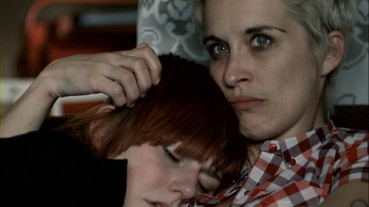
However, don't be fooled into thinking this is one of those dry little EPK's (there's no censoring in regard to swearing, but it's nothing you wont hear in the series itself) since keeps things light, and there's an endearing candid feel to it which a would be lost if it were like the slickly produced, bells-and-whistles packages found on other mainstream releases (there's even a guest appearance from Joseph Gilgun's parrot!). This way, it manages to capture the experience of working on the series and the bond between the cast without being self-congratulatory. While it's obvious that a lot of hard work, care and attention were put into the production, it's just as clear that they had a great time during that process.
Outtakes (7:02)
Strangely, after commentaries, these are my favourite kind of extra. The novelty of corpsing and mistakes never gets old, because sometimes the recovery is just as creative as the slip-up. Everyone gets a look in here, from Flip and Gadget, to the whole gang taking on The Time Warp between takes (yes, really!). There's even a special appearance by episode one and two director Tom Harper during the sing-along bus journey to Woody and Lol's wedding. However, the gold star has to go to Kriss Dosanjh, for managing to keep the straightest of faces when a very particular customer (played by Kayvan Novak of Fone/Facejacker fame) enters Mr Sandhu's shop looking for Debbie Does Dallas …
Deleted Scenes (12:37)
A collection of extended and/or cut scenes from the series. There are some interesting inclusions here, and though they don't carry any commentary to underline why they were removed, they stand up perfectly well on their own (personally, I would have liked some, but there are obvious logistic issues with a multi-authored project such as this). For the hardcore England / England '86 devotee, you'll be making extensive use of skip (or fast-forward and rewind) buttons, since they aren't accessible separately.
Predominantly, these scenes fall into two camps. The first of these, 'can't fit,' are those cut due to issues of pacing or plot, as with the extended scene with Flip and sidekick Higgy at Gemma's house or the gang in the hospital corridor after Meggy's heart attack (both in episode one). The second, 'won't fit,' are those excised for stylistic and or tonal reasons, such as the final version of the aforementioned scene with Shaun at the video shop (cut from episode two), which shifts into rather strange, bordering on surreal territory. It's exactly the kind of curious, standalone scene that's made for this purpose, since I can't really imagine it within the episode itself, but once you know it exists, you want to see it for yourself.
Reasoning aside, there's some interesting additional material here, whether you're in it for amusement or a bit extra from the characters you've come to love. If you're a long-time Meadows fan, and found yourself hankering after a little more of the writer-director than the blink-and-you'll-miss it cameo as one of Woody's workmates in episode three, then you'll find it here in an extended sequence. We get to see Woody on the factory floor proper, attempting to call the shots and take a sip on an unattended cup of Britain's national drink, tea. Meadows and Gilgun both are great here, and it's one of the many treats this release offers its faithful fanbase. If connections to the film and tying up of loose ends are what you're after, then that's here too, in there's a scene with Milky and Shaun cut from the house party in episode two. Their brief but revealing chat marks the first and only time the characters speak to each other, and directly addresses links between the film and the series, since they talk about Milky's assault at Combo's hand three years prior. Milky handles things with typical machismo, letting Shaun off the hook, whilst he confesses guilt at not being strong enough to stop things from getting out of hand. Dramatically and narratively, it's nice moment, and brings England and England '86 together rather neatly. It's a shame it couldn't have been included in the broadcast version for that very reason, but, the neatness of resolution may have been deemed be too neat, and raised questions concerning Combo, or rather, the lack of him, far too early, thereby diminishing the impact of his eventual return.
Photo Gallery (2:52)
A slideshow of over forty pictures, taken by Meadows' long-time on-set photographer Dean Rogers (for admirers of his work, you'll see more on the disc menu's, since they're used as backgrounds). There's a mixture of behind-the-scenes and still photography throughout the production of the series (some of which you'll recognise from show publicity), soundtracked by The Wedding Present's “Once More.” There are some great shots in here, ranging from those that are rather beautiful and atmospheric, to more candid pictures of the cast and crew at work (and play!).
This is England '86 is a rarity in that it builds upon the popularity generated by its cult filmic predecessor, This is England, rather than destroy it. Of course, the series won't please everyone who was so enamoured with the film, but it doesn't have to either. Heartfelt, honest and challenging in a way that television rarely is, this is a rather unique example of contemporary quality television with strong writing from Thorne and Meadows both. Pivotally, in a character-driven piece like this, there are equally powerful performances to go with it. Whether a fan of Meadows or British drama in general, this is an essential purchase. Highly recommended.
|